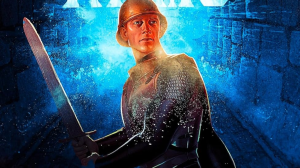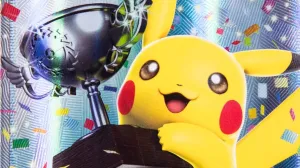DIE #20 provides a fitting and direct end to a long and thoughtful series examining our relationship with roleplaying games. In December 2018, Image Comics published DIE #1, a comic book in which a group of broken adults returned to the fantasy hellscape they found themselves trapped in for several years as teenagers. The series, written by Kieron Gillen and illustrated by Stephanie Hans, was described at the time as “Goth Jumanji,” which hinted at a more lurid take on a tale where a group of players get trapped in a game they were playing.
Videos by ComicBook.com
2018 was also the year I started writing professionally about the Dungeons & Dragons game and franchise for ComicBook.com. And it was the first time I had run a D&D campaign – my previous experiences with roleplaying games involved the similar but “more crunchy” Pathfinder. I was not a veteran Dungeon Master when I began reading DIE, nor did I have a deep understanding of what DIE meant at its most fundamental level. As I grew in experience as a Game Master and found myself increasingly invested in the world of Dungeons & Dragons, DIE continued to grow from its “players trapped in the world of the game” mold to become a story about a group of people confronting the darkest aspects of their own personalities and interpersonal relationships with each other to survive. In 2018, I didn’t understand that aspect of DIE and what it had to do with games and communal storytelling. As DIE #20 is released in 2021, I understand it a little better.
In 2020, in the depths of the pandemic, I started a new D&D campaign with the group of players I had started playing roleplaying games with several years ago. Over time, that campaign of 6 players became a campaign of 18 players, spread over the course of three nights. With the world shut down and me all but trapped inside my house, that campaign became one of the most precious things to me. I cared about the characters who inhabited the world, I cared about players (who ranged from my wife and best friends to near-total strangers) who helped me build that world, and I hated….I hated whenever someone did something that threatened the fragile ecosystem of 19 people with radically different backgrounds and playstyles working together to build a cohesive narrative. To preserve that precious balance, I became a mediator and administrator, I bent over backwards to accommodate inane requests, and I compromised in ways that made me uneasy and upset. But I did it… because it was for the sake of the game. Eventually, I wizened up and brought this wonderful game to a conclusion before it became parasitic. My relationships with my friends and players were salvaged. Stepping away, even for a short time, from the game did a world of good and helped bring context to my relationship with the campaign, my players, and my friends.
When DIE started, I found it weird when Gillen talked about how DIE would examine how one can lose themselves in a game and whether “losing yourself” in a world was worth it. I guess I understand that message a little better now. The characters of DIE lost a part of themselves during their first trip into the world of the game, and they couldn’t truly move past that experience until they returned. In the final issue of DIE, we see the players confront the very concept of the game itself and it’s only through self-examination and self-confrontation (both figurative and very literal in this issue) that they are able to leave. In this case, the players leave behind something toxic and re-gain something “good” they left behind in the first place. Things don’t always work out that way in the real world, and even in DIE, the characters question whether that raw and brutal soul searching is worth the effort.
DIE is about more than games or even our relationships with those we play games with. When you truly allow yourself to be consumed by… anything, whether it’s a piece of fiction, the drama of national politics, a captivating true crime podcast, or a band’s discography, you risk that thing becoming a parasite. People are quick to define themselves by their fandoms, whether it’s the comic book characters they like, or the games they play, or the teams they watch, or music they listen to. DIE asks the question if letting that fandom feed on your soul, if inviting it to become a part of your true self, is a good or bad thing. It provides no easy answers—enjoying something to the point that you “lose yourself” to it can provide relief, joy, and comfort, and it can also be toxic and harmful—but the examination itself was poignant, thoughtful, and masterful throughout. Maybe the true joy of DIE, much like that in the best fantasy roleplaying games, is the journey we took reaching the end of the story.
Published by Image Comics
On September 29, 2021
Written by Kieron Gillen
Art by Stephanie Hans
Letters by Clayton Cowles
Cover by Stephanie Hans








